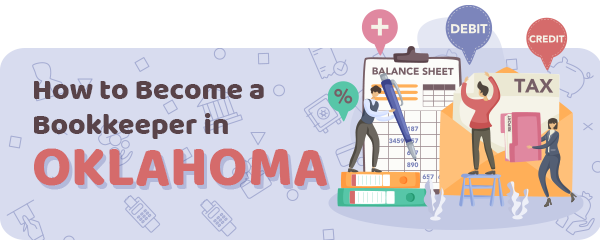A bookkeeper is a person who understands accounting, though some confuse them with accountants.
This job is for people who are good at math and keeping things organized.
Their main job is to write down sales, purchases, and other business transactions.
It’s a stable office job, and if you want to be a bookkeeper in Oklahoma, you’re in the right place!
Keep reading to learn more!
Article Table of Contents
How to Become a Bookkeeper – Step by Step
Getting a license is smart because it helps you find more job opportunities.
But how do you get certified?
There are two main ways:
- Through learning
- Through experience
Even though these paths are different, they have some similarities.
Let’s examine these steps more closely.
Step 1 – Earn Your High School Diploma
Anyone who plans on becoming a bookkeeper in Oklahoma needs to get a high school diploma first.
A GED is a viable alternative for those who are unable to get a high school diploma.
Step 2 Education – Earn a Degree
Getting a degree is great because it shows you’re serious about your job.
Having a degree makes it easier to get hired because bosses like to hire trained bookkeepers.
According to the Bureau of Labor Statistics (BLS), it’s good to aim for a degree if you’re taking the education path.
You can pick from:
- Associate’s Degree
- Bachelor’s Degree
- Master’s Degree
You might not go for a master’s, but it’s good to know about it.
Soon, you’ll also find out about programs where you can learn and get trained.
Step 3 Education – Train on-the-job
The first step is getting trained, which is important.
During on-the-job training, you’ll spend about six months learning.
This training is different from practicing because it’s shorter and focuses on real tasks.
If you’re going through the education path, you’ll need to understand how the company’s bookkeeping software works.
You’ll also need to work fast to keep track of the company’s transactions.
Step 2 Practice – Gain Experience
After deciding on the practice method, the next step is to gain experience.
You’ll need between 1 and 2 years of experience, depending on which credential you want:
- Certification
- License
You can accumulate it by working entry-level jobs within the field.
Step 3 Practice – Earn the Credentials
There are 2 main bodies issuing credentials to bookkeepers:
- The American Institute of Professional Bookkeepers (AIPB)
- The National Association of Certified Public Bookkeepers (NACPB)
These licenses are recognized everywhere in the country.
To get certified, you need to pass four tests for each.
If you go for both, that’s eight tests you have to take.
You can take two exams at specific Prometric testing centers.
The other two tests let you use your manual.
You can start getting certified even while you’re still studying.
Once you’re licensed, you need to do 24 hours of learning every year to keep up in the field.
Bookkeeping Programs in Oklahoma
Let’s see the programs that you can enroll in to become a successful bookkeeper in Oklahoma.
Oklahoma Christian University 
Students in this program are getting ready for starting jobs in accounting, whether it’s in public, private, or government sectors.
The requirements for taking the Certified Public Accountant (CPA) exam can vary depending on the state.
In Oklahoma, to sit for the CPA exam, you need 150 college credit hours, including 36 hours of upper-level accounting courses.
You can meet this requirement by either joining the M.Acc. or M.B.A. program in your senior year or taking extra undergraduate courses.
Graduates from OC with a Bachelor of Business Administration degree in Accounting will:
- Learn the basics of business.
- Understand the importance of ethics
- Develop critical thinking, analytical, and problem-solving abilities.
- Be able to work well in a global setting.
- Improve their professional and persuasive communication skills.
Students must finish at least 122 credit hours.
Additional elective courses might be necessary to reach the 122-hour requirement.
The program lasts for 75 hours.
| School Name | Address |
|---|---|
| Oklahoma Christian University | 2501 E Memorial Rd, Edmond, OK 73013 |
Bookkeeper Salary in Oklahoma
So now that you finished training, you probably want to know how much you can earn.
You should know that bookkeepers in Oklahoma make a median wage of $40,996 per year.
You can make more or less based on the area where you live, education, and experience.
But, have a look below to see the table that highlights the areas where bookkeepers earn more.
Annual Salary Range:| Location | Avg. Annual Salary |
|---|---|
| Hendrix | $43,389 |
| Marietta | $43,389 |
| Bennington | $43,389 |
| Albany | $43,389 |
| Tulsa | $41,927 |
| Oakhurst | $41,927 |
| Jenks | $41,882 |
| Sapulpa | $41,838 |
| Broken Arrow | $41,794 |
| Bixby | $41,749 |
Regional Salary in Oklahoma
| Region | Employed | Avg. Annual Salary | Avg. Hourly Pay | Top 10% Annual Salary | Bottom 10% Annual Salary |
|---|---|---|---|---|---|
| Enid, OK | 260 | $42,440 | $20.4 | $60,120 | $25,740 |
| Lawton, OK | 380 | $38,720 | $18.62 | $54,480 | $24,930 |
| Oklahoma City, OK | 7,260 | $45,030 | $21.65 | $61,920 | $31,200 |
| Tulsa, OK | 4,560 | $44,640 | $21.46 | $62,420 | $25,670 |
* Employment conditions in your area may vary.
Frequently Asked Questions
What are the most important abilities a bookkeeper needs in Oklahoma?
To excel as a bookkeeper in Oklahoma, it’s essential to have the following skills:
- Attention to detail
- Proficiency in invoicing procedures
- Critical thinking abilities
- Strong organizational skills
- Effective communication skills
- Efficient time management
Can I work remotely as a bookkeeper in Oklahoma?
Absolutely!
Becoming a virtual bookkeeper offers two paths:
- Seek job opportunities labeled as “Remote,” enabling virtual work for a company.
- Start your own freelance business as a virtual or “remote” bookkeeper, promoting your services independently.
What role does a bookkeeper have in a company, in Oklahoma?
If you’re seeking a job in this role, your responsibilities will involve:
- Monitoring sales and purchases.
- Improving the company’s financial status.
- Documenting other transactions within the company.
- Efficiently using reporting tools.
- Developing, implementing, and overseeing systems to track money flow.
These duties are essential for maintaining precise financial records and safeguarding the company’s financial well-being.
Read the full guide: How to Become a Bookkeeper

